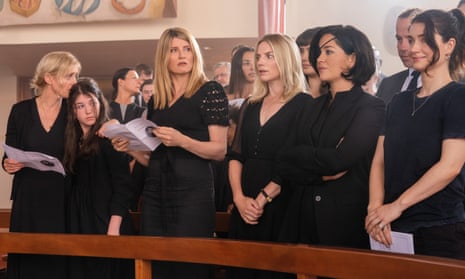Bad Sisters (Apple TV+) is an adaptation of The Out-Laws – the Belgian series by Malin-Sarah Gozin, which was described by this here very organ as “the blackest comedy ever”. To know that it has been retooled by, and stars, Sharon Horgan is to be reassured that nothing will be lost in translation. This well-founded hope is confirmed within the first few minutes, which see widow Grace (Anne-Marie Duff) pressing down hard on her dead husband’s genitals to try to rid him of the erection she has just noticed he is maintaining in his coffin. “Post-mortem priapism,” explains her sister Ursula (Eva Birthistle). “It’s not uncommon. Especially after a violent death.”
The stage, in so many ways, is set. There are five Garvey sisters – Eva (Horgan) is the oldest and took on the maternal role after their parents died. Ursula is a nurse, a mother of three and sensible, except for the affair she is having with her photography teacher. Bibi (Sarah Greene) is fiercely uncompromising, Becka (Eve Hewson) is the slightly aimless baby of the family, and Grace is the only one even slightly mourning the death of her spouse John Paul (Claes Bang).
When we flash back six months, it becomes clear why. With painful, pinpoint accuracy, he is shown to have been a controlling, coercive, borderline physically violent man who has spent the years of his marriage to Grace eroding her strength and her spirit. Their scenes together are agony as he needles, wrongfoots and destablises her at every turn, closing down her options at the tiniest levels so that the idea of making freer, bigger choices is no longer even part of her mental landscape. He is now expanding his reach and beginning to do the same to his early-teenage daughter – policing her diet, her social life and even pocketing her confirmation money for his own use. At the wake, a guest tells Eva he is sorry for her loss. “I’m just glad the suffering’s over,” she says. “Oh – was he ill?” says the surprised guest. “No,” she replies.
Just as perfectly portrayed is the other sisters’ appreciation of what is happening and their powerlessness to do anything about it. Until they have a whiskey-soaked chat on the beach, after their traditional Christmas family swim (which John Paul has finally succeeded in keeping Grace from attending). They share their secret fantasies about how to get rid of him, before they burgeon into workable theory and then practice. The second episode (two have been released initially by Apple – the rest will follow weekly) covers the first, failed execution of the tyrant in the sisters’ midst. Various other attempts go awry too but we must assume, from the corpse and the sisters’ shifty behaviour since, that one of them worked in the end.
Unfortunately for the sisters, we are not the only ones who suspect foul play. Eager not to pay out on a hefty life insurance policy that will bankrupt the firm he inherited from his father, agent Tom Claffin (Brian Gleeson) and – more reluctantly – his half-brother Matt (Daryl McCormack) start digging into what happened on the night their client died.
It is a dark comedy indeed. Some will find it too dark, no doubt, just as others will find it too comedic given the central subject is domestic violence. But most, I hope, will find the two elements mostly working in harmony – the serious, unshakeable sorority among the Garvey women, albeit expressed largely in bickering and banter, matching, rather than trivialising, the suffering elsewhere.
It is possible that a stronger show would have emerged if John Paul had been made a little less relentlessly monstrous. He exercises his cruelty without, it seems, much discrimination: he humiliatingly refers to Eva’s infertility in public; he snaps at Ursula’s son, who has Down’s syndrome, when the boy tries to hug him. And these are even before we move on to his larger machinations. There’s his blackmailing of Ursula over her affair; his financial ruining of Becka; and his attempt to sabotage Eva’s promotion. At times, all this threatens to make him a cartoonish villain, and undermine the show’s good work elsewhere. When his toxicity is so obvious, it makes it harder to believe that a group of siblings as close and forthright as the Garveys wouldn’t have intervened in the relationship earlier and, more substantially, long before it got to the point when murder seemed the only way out.
Regardless, as an exercise in catharsis, Bad Sisters is wonderful. It is also superbly constructed, perfectly paced and brilliantly performed, with Horgan on top form as both writer and actor, surrounded by a cast who don’t put a foot wrong. Wittily directed (by Rebecca Gatward, Josephine Bornebusch and Dearbhla Walsh) and gorgeously shot, this is a fine addition to the growing collection of stories told unapologetically for, by and about women on mainstream television. Sorority takes many forms.
